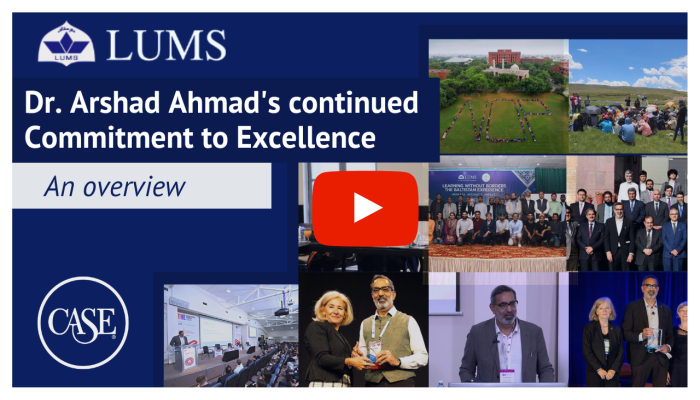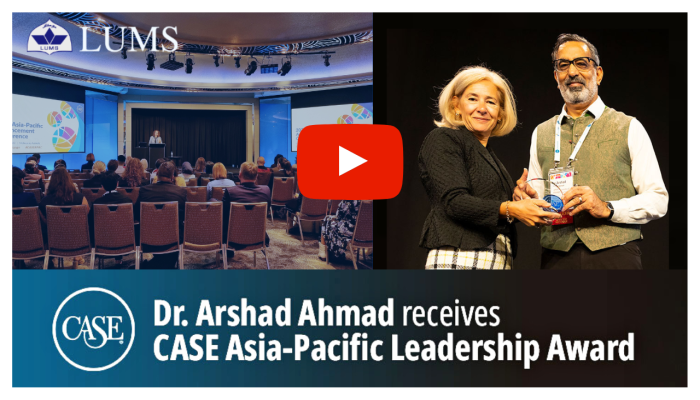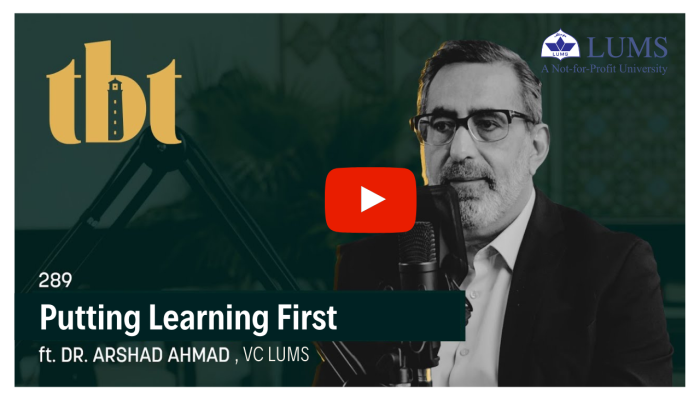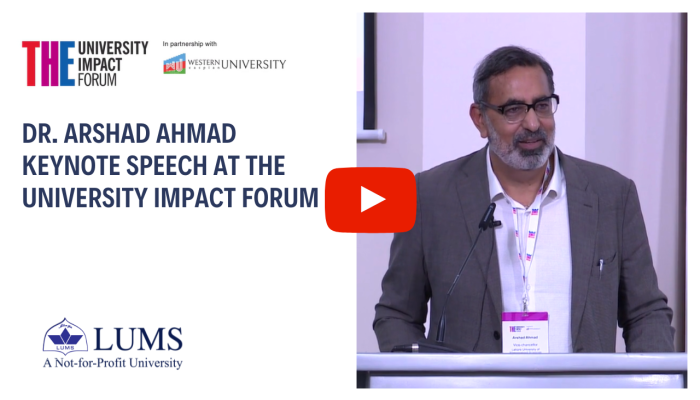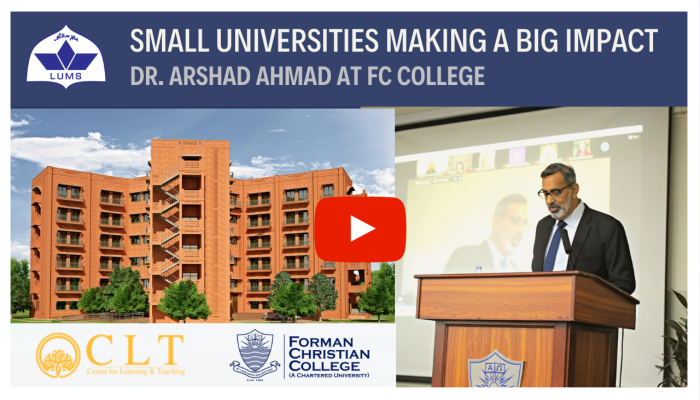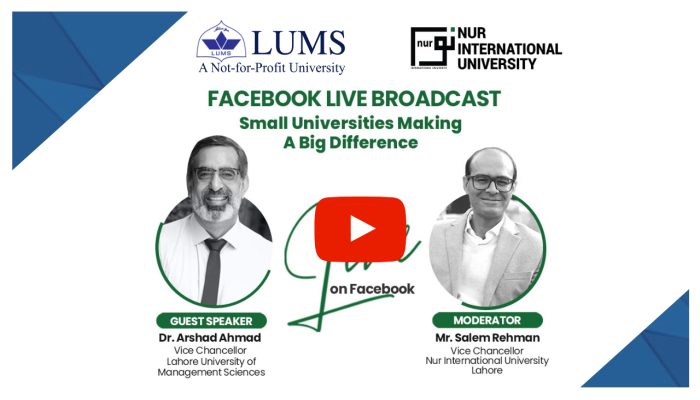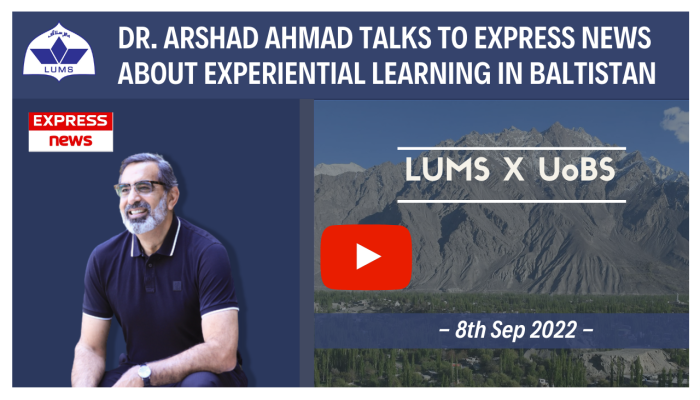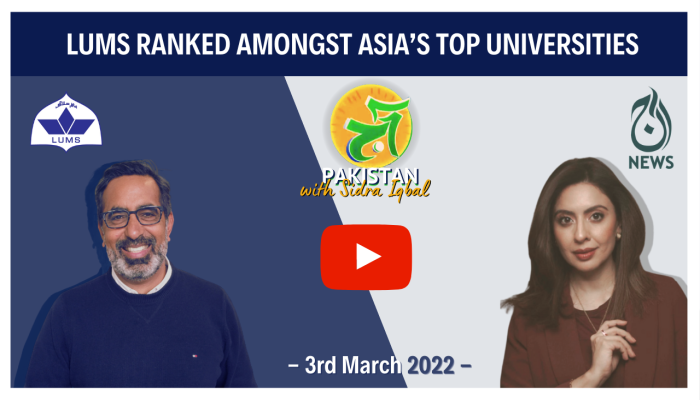Talks and Interviews
Keep up-to-date with Vice Chancellor Dr. Ali Cheema by reading his speeches and watching his latest interviews.
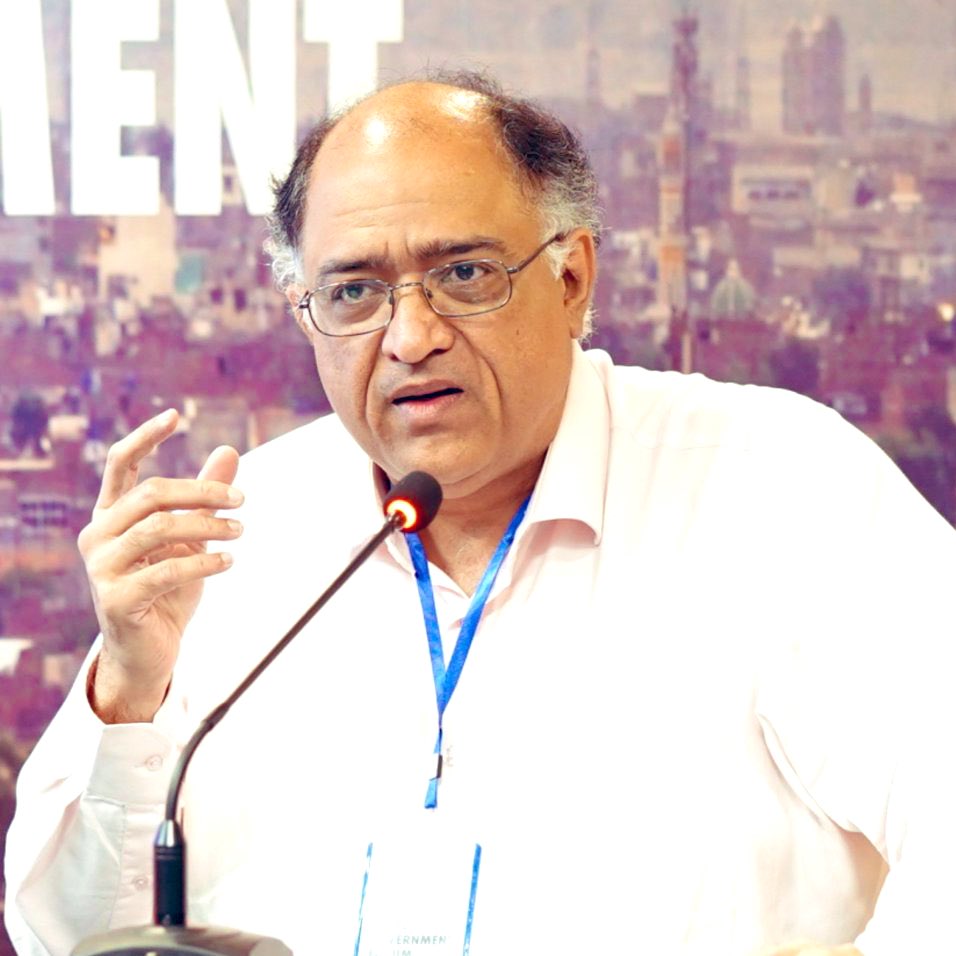
- MBA Summer Immersion ProgrammeAugust 19, 2019MBA Summer Immersion Programme
Rector Shahid Sb, Babur Sb, colleagues and the MBA class of 2021 – Askm and welcome to the Summer Immersion Program at SDSB!
By now you know that you’ve joined LUMS’ flagship MBA program which has its roots since the time LUMS was founded back in 1985.
By now you know, that this is the only internationally accredited program in Pakistan and is part of a select 5% of the business-accredited programs worldwide. This means the SDSB MBA has differentiated itself. It has differentiated itself as pioneers of the Harvard case-teaching method with our faculty producing the largest repository of business cases – over 800 in all of Asia.
SDSB also has a record of placing 100% of you within 6 months of your graduation. It also has a stellar reputation in the business community in producing remarkable leadership across Pakistan and overseas.
What you may not know is that LUMS is a private, not-for-profit institution that is not a school of privilege but rather a footprint of diversity from all corners of Pakistan. And meeting this challenge to support diversity is a commitment that differentiates LUMS from other universities.
Students are admitted solely on merit and financial support is provided to one out three students in need – last year Rs. 1 billion was disbursed through scholarships and financial aid. We thank our sponsors and donors and philanthropists like Syed Babar Ali Sb, and the Husain family, as well as the business community whose patronage provides unparalleled higher educational experience to all our students.
LUMS also distinguishes itself as a learning organization where research and teaching are geared to enable you to address challenges in Pakistan and beyond. This is why our motto of “no boundaries” applies especially to you, who come from diverse backgrounds and experiences. I encourage you to learn from colleagues in our sister schools of Humanities & Social Science, Science & Engineering, Law, and Education which are all at your doorstep.
Looking back at some of the most important decisions that shaped my career, they were in hindsight, quite risky.
For example, I developed expertise in two unrelated disciplines – finance and psychology, and over the years I learned to connect the dots and appreciate other points of view. This is an important lesson as societal challenges require connecting many dots that can only be derived from cross-disciplinary teams. These teams see patterns that individual experts cannot see. And what seemed impossible, in hindsight becomes the new normal.
While you will remember the challenges of analyzing a case study and getting through exams, or the stamina required to pull off the relentless MBA schedule, intellect and your ability to work hard aren’t going to be enough to tackle the challenges that you will inherit. This is not to diminish the importance of intellect and hard work as obviously all employers want to invest in people with these traits, but the truth is that these are fairly easy to find in the marketplace.
But consider for a moment other character-traits that can be equally impressive. Like trust, integrity, humility, selflessness, and developing others. These are commonly associated with successful leaders.
So, if you had to invest in colleagues from your cohort, what traits would you look for in the people you hire?
If you had to choose, would you look for smarts and drive or someone you can trust who has your back?
The good news is that these character traits can be developed, especially when you are young because these are qualities and habits that we can all improve but are much harder to change later on in life.
As the MBA market becomes more crowded, your calling is therefore not only a function of your intellect and personal ambition but for the types of qualities that make successful leaders – a clear moral compass, generosity to nurture friendships and a greater purpose.
Let me also add, that we, the administration, the staff and especially your teachers – we, would like to engage with each and every one of you throughout your journey here at LUMS – in the hallways, at weekly events, in the sports facilities, and of course at your convocation!
Welcome aboard on a journey of a lifetime.
Together inshallah, you will not only make your parents and families proud, you will fulfill the dreams that make us proud to be Pakistani. Thank you.
- Graduate Night 2019July 4, 2019Graduate Night 2019
Honourable Rector, Mr. Shahid Hussain, esteemed members of the Board of Trustees, faculty, colleagues, proud parents, distinguished guests and the graduating class of 2019, Assalamalaikum.
Welcome to the Graduate night. Also known as the LUMS Oscars for super-achievers. On this auspicious occasion, getting to the podium isn’t because of luck, or genetic predisposition. You are here because you have excelled academically. You have worked exceptionally hard and demonstrated integrity and perseverance.
Of course, there are other reasons that have led to your singular achievements. Before I elaborate on these reasons, I ask everyone to join me in congratulating and applauding our outstanding students. Now the reasons; first and foremost, you are here because your family believes in the value of education. Your success is more important to them than anything else. To all the amis, abus, uncles, dadis and dadas – you don’t get enough credit for everything you do. Please accept our heartfelt gratitude and thanks.
Secondly, dear students, your teachers accompanied you throughout your journey. You can blame them for robbing you of your sleep, or for inflicting cruel and unusual punishments on you, day after day, night after night. You might have thought that a 4-year boot camp in the Sahara would have been easier. But here you are!
My dear students, your teachers are more than experts. Whether you like it or not, they have become your family. I ask you to join me in appreciation for your teachers. You are also here tonight because of something my late father used to say. It went something like this:
Son, nothing in life should be done in excess. Except for one thing. That one thing is the greatest of all secrets. Not everyone can unlock it. In fact, it is greater than the most sustainable source of energy that man will ever find. That thing he spoke about, while it may sound clichéd, is really true. It is a yearning and a hunger to learn that ultimately takes you as far as you want to go. It isn’t only wanting to learn. It is also about what the writer and futurist Alvin Toffler said:
“The illiterate of the 21st century will not be those who cannot read and write, but those who cannot learn, unlearn, and relearn.”
My dear students, it is this attitude towards learning that will be the defining quality of success for the 21st century leaders.
As you celebrate tonight and tomorrow night, a new reality and new challenges await you. They await especially you, because your success tonight opens wider doors of opportunity. But opportunity that can bring greater awards always come with greater risks.
So let me ask you: as you transition to the next chapter in your life, will you be an engine, or will you be the car? Allow me to explain:
Take the case of a farmer’s son who turned out to be one of the most important innovators of the last two centuries. He had a great invention, but no suitable fuel, no machinery to connect it to, no optimal application and he wasn’t able to put it into practice in a way that had any significant impact on anyone, let alone the world. His name was Nikolaus Otto. You have likely never heard of him. Yet Otto invented the internal combustion engine in 1876. Today, his invention continues to influence our way of life, our environment, urban and infrastructure planning, the global economy and even global geopolitics.
Now all of you have probably heard of the following two men - a German named Karl Benz and an American named Henry Ford.
You see, Otto’s innovation was, effectively, just sitting on a shelf accomplishing nothing. Then Karl Benz translated Otto’s work into practice by developing the world’s first car. Then Henry Ford translated Benz’s and Otto’s work into a product that he could manufacture at scale which completely transformed the way we live. The point is, the world you inherit has no shortage of engines. The shortage, however, are capacities to think like a Benz or act like a Ford. These types of leaders translate ideas into practice that change lives. Translation opportunities are especially true in Pakistan. Especially if you want to do your part in nation building.
As one of the youngest and the 6th most populous country in the world, we must do more than business as usual. We need to make the kind of difference your parents and teachers have made to you. In fact, we need to look no further than our alumni for inspiration on how to make a difference.
On the academic side, LUMS has produced more Fulbright scholars than any other university, anywhere in the world. More than 33 of them teach right here at LUMS.
On the entrepreneurship side, allow me to mention only two, who not long ago were wondering what to do after graduation. They went on to translate simple ideas that are now saving lives.
Musa Aamir, BSc ‘17, began his mission from the LUMS Pepsi Dining Centre (PDC) by collecting change in coins discarded by people. He teamed up with Huzaifa and Qasim and approached the LUMS administration to create a fund for the excess change received at PDC. Then they used the money to provide healthy lunches to children at government primary schools. You have probably heard of their organisation called Rizq; a food recovery and distribution service. Rizq has become a movement with student chapters in different cities within Pakistan and around the world.
So far, Rizq has provided over 1.5 million meals, saving more than 100,000 kilograms of food and channelled $350,000 worth of food philanthropy. Rizq has been recognised among the top 50 social enterprises of Pakistan, top 3 social enterprises of 2017-ENGRO ITAC and top 20 social enterprises of South Asia-SPRING Accelerators.
Or take Luqman Ali Afzal, who managed the ‘Khokha’, with only two employees, seventeen years ago at LUMS. Today, his Monal Group employs over 2,400 people at four restaurants, two banquet halls, and two amusement parks spread in Islamabad, Rawalpindi and Lahore. Luqman teaches at LUMS and incidentally also works with Rizq. Monal also manages a school and a hospital in Luqman’s ancestral village which is completely free and serves more than 500 patients each day.
There are many more examples. But today we celebrate your compelling stories. Tomorrow and the day after, as you make your difference in those you are destined to lead, we will look to your leadership.
On behalf of the teachers, parents and your friends at LUMS, we take immense pride in your accomplishments. Congratulations everyone! Now, go change your future. And with it, change the future of Pakistan.
Thank you. May God bless you.
- LUMS 31st ConvocationJuly 3, 2019LUMS 31st Convocation
Honourable Rector, Mr. Shahid Hussain, our convocation speaker, Ms. Sania Nishtar, internationally acclaimed Pakistani physician, leader and role model; esteemed members of the Board of Trustees, faculty colleagues; proud parents and the graduating class of 2019:
Assalam-o-Alaikum and welcome to the Convocation Ceremony for the 31st graduating class of LUMS.
Dear graduates. The moment has finally arrived. I am now the last official standing between you and your degree! But, before you get to the podium, it is a time-honoured tradition for the Vice Chancellor to acknowledge publicly, the significance of this milestone achievement that is yours for the taking.
Let me begin by putting this memorable day in context. 0.001% of Pakistan’s population attend some 200 universities here. You are one thousand and thirty-four among the 250,000 who are graduating this year. This is an enormous privilege which 99.9% of Pakistanis can only dream about.
While LUMS graduates are a drop in the ocean that is Pakistan, you are also its greatest treasure, because you have the ability and the potential to create great impact. That impact begins with your life’s story.
Following my speech, we start a new tradition at this convocation to hear from your Valedictorian, Waqas Haider who will tell his story. And inspire you to join 12,182 Alumni who have gone on to tell their stories. These collectively are LUMS Ki Kahani. And they matter.
They matter because as the great anthropologist and writer Margaret Meade, once said:
“Never doubt that a small group of thoughtful, committed citizens can change the world; indeed, it's the only thing that ever has”.
Before I ask you to consider what will be your Kahani, what does it mean to have a degree?
Can it mean that your degree was given to students with great SAT scores and genius level IQs who also failed exams?
Or where long hours and little sleep became the norm?
Where the TV show “Survivor”, should be filmed and all of you would have starring roles?
Where failure is a great teacher and humility a great source of respect?Where rigour and intensity forge deep friendships and where intellectual development comes to terms with emotional growth and socialisation.
In other words, your degree earns you the right-of-passage conferred to the very few whose lives are changed.
So, let it be heard. Loud and clear:
Congratulations to each and every one of you.Applaud your achievements, applaud your friends and most of all, applaud your teachers and your families.
My dear students and soon to be graduates, you have laughed together and cried together. Like soldiers who have fought alongside each other, you have shared experiences that the rest of the world may never understand.
But I stand here not to ask what LUMS has done for you, but to ask whether this defining moment speaks to your calling. Some of us who are older, remember that this important phase of development was when “youth was truth”. Or what the Pulitzer Prize writer Pearl S. Buck said:
“The young do not know enough to be prudent. And therefore, they attempt the impossible. And achieve it, generation after generation, after generation.”
Your teachers accompanied you on this journey and revealed what lies half asleep in the genesis of your knowledge. They showed you wisdom, but it was their conviction that was contagious. They have pushed you out of your comfort zone. Challenged you. Tested you. And who can deny today, that you have endured?
You, who started your journey on a dirt road from 162 villages, towns and cities to LUMS that represents Pakistan.
You who could have never imagined that confusion is a necessary part of your learning, or if you were struggling, it did not matter as long as you kept learning alive, through perseverance and through friendship.
Dear graduating class of 2019, what you studied and practiced at LUMS came with hard and fast ‘rules of the game’. The do’s and don’ts. Your teachers defined the boundaries. Your staff supported your efforts.
The next chapter in your life will greet you on its own terms. Some rules will apply, and some won’t. Some skills will be tested now, and some later.
For when the sun comes up tomorrow, another journey will begin.
Tomorrow, many of you will ask yourself
What should I do next?
What business should I join or start?
What opportunities should I explore?But consider this. Every professional in the world knows what they do. Some know how, because they do it well. But few dare to know, ‘why’ they do it.
If there is one thing, I want you to take away from this speech, let it be this: Find not what you want to do, but why you want to do it. Find not your profession, but your purpose. Find not money in your work, but a meaning that speaks to your calling. Find your why.
The 21st Century you inherit belongs to those who have learned how to learn, unlearn and relearn. It means that your next exam will test for achievements that are not recorded on your transcript. The next series of life-exams will test the choices you will make, that will ultimately speak to your calling.
When I look back at my first vocation, I became an accountant to please my late father. I found the programme difficult and uninspiring, but I did it, nevertheless I can now say that I’m glad I listened to him because next to health, I have learned that financial literacy matters no matter what you do.
My second subject was a longer affair which led to a professorship in a Canadian university. It was more challenging, and I became an academic. But the truth is, that too was not enough. I stumbled onto my third subject, which was psychology, which I did my PhD in.
One lesson from my own story is this: Finish what you set out to do. Remain curious. Ask questions and submit to how little you know.
The corollary is that there is only one thing in life that you should do in excess. And that is intentional, purposeful learning.
Because learning is the only sustainable fuel that takes you as far as you want to go. It is also contagious because those who you will be responsible for will learn by your side. Just as you did during your journey at LUMS.
Dear Class of 2019,
You are your parents’ greatest treasure. And they understood their duty to open the doors of learning for you, so that you can open the doors for your sisters and brothers in Pakistan.
Your actions will literally define the future of this nation. And while Pakistan is young, our heritage takes its root as one of the first seven civilizations. With an enviable tradition of art and architecture, music, poetry and culture. A country that’s diverse in its people and places. A country where we speak more than 70 languages.
Yes, 70.
And a place where opportunities to work, create work or make a difference are abundant.
So, with your degree in hand, and a heritage that very few countries are blessed with, you are fortunate. And hence, you must protect this fortune. To protect this fortune, ask difficult questions.
For example, what does it mean to be a Pakistani today?
Privileged or Deprived?
Confident or Cynical?
What role can you play to reclaim a sense of purpose in civic society, ethical development and citizenship?
What types of leadership can we model for those less fortunate than us?You step into the world as ambassadors of learning, and as ambassadors of Pakistan. Whether you like it or not, you are LUMS. You are Pakistan.
It is now your time to lead.
And I know you will.
God bless all of you.
- ‘Learning How to Learn’ at Agha Khan UniversityJuly 1, 2019‘Learning How to Learn’ at Agha Khan University
Colleagues, ladies and gentlemen, ASMK. Thank you for being with us this afternoon.
From a helicopter view, the Pakistani education system is broken. Schools are trying desperately to keep up with a tsunami of young students coming into the system. The numbers are staggering. 25 million students drop out of school. They are the sons and daughters of illiterate parents multiplying in the millions, from one school district to another.
The weakest link in the system are the formative years of primary schooling. We neglect K-5 more than any other segment and this is where the greatest damage is done and when most students drop out. The impact cascades into the system and the country loses its most precious resource – young kids.
As for postsecondary education, during the last 15 years, access has increased 15-fold, but for a country of 220 million, we have some 250,000 students in 200 universities which is .001%. And within this smaller universe, we don’t do very well on the teaching front. The bigger story is learning.
We need to learn about learning which each of us values, especially parents, but know very little about how it occurs. So, we should be asking who are the experts who can give us some insights about learning?
The experts are folks who study cognitive-science, neuro-science and educational psychology. Suppose we took the most important lessons from these experts and put together some courses that would help students to learn how to learn?
Furthermore, suppose these courses provided practical, useful insights and techniques that helped students, irrespective of their age, to succeed in challenging subjects like math, physics, or for that matter any subject that appeared daunting?
So here’s some good news. Such courses exist. One of them has taught millions of students. Learning How to Learn is the world’s most subscribed online course. It is in demand because there is no other course like it. 2.5 million students have taken the course to date and over a thousand enrol in it each day.
The course addresses challenging problems students face such as procrastination. Procrastination has severe long-term consequences.
It leads to cramming and memorisation, which reduces success in learning. Yet, we rarely give students insight in how to effectively manage procrastination.
The same can be said about nutrition, sleep and exercise. These are also critical elements in the learning process. But most people don’t know why. And if we just tell students without them knowing why, they will ignore us.
But now, we now know why. We can show students what is happening inside their brain when they practice. Or when they take a refreshing break. Or when they sleep.
Space repetition, avoiding cramming, deliberate practice and other techniques produce demonstrable differences in student’s learning outcomes.
In other words, it is quite amazing that our children go through a decade or more of formal education and yet, they are never taught how to learn effectively?
We can change that now.
We can move into the future by providing our students training on a massive scale by reaching students and teachers directly. We can reach them with high quality materials to convey the best of what we know from research on how students learn effectively.
It is time we reached out directly to students with courses that will be immensely helpful to teachers who will find it easier to convey challenging material and promote deeper understanding.This brings me to introducing today’s keynote speaker, Dr. Barbara Oakley. Barbara’s innovations began in the classroom, then manifested in a bestseller book culminating to very effective online video-based set of courses accessible to all.
The Wall Street Journal recently described her work as “revolutionary” as she simplifies the complex intersection of neuroscience and social behaviour. If universities are Goliaths, Barbara is our David. Let me explain.
I’ve spent my academic career in Canada. The largest university in Canada is the University of Toronto with nearly 90,000 students and over 600,000 alumni. It’s size has a huge impact on Canadian culture and society. Barbara Oakley co-authors with Terry Sejnowski to teach Learning How To Learn. This MOOC has had three and half times more students than those that have ever taken any course at the University of Toronto. So, in a way, Barbara is bigger than the University of Toronto!
In my previous role, Barbara was a distinguished scholar who produced her 2nd MOOC with us at McMaster University called Mindshifts. By the time I moved to Lahore last year, Barbara had developed Learning How To Learn for Children.
When I told her that Pakistan’s demographic makes it one of the youngest countries in the world, she offered to gift her scripts, her story boards and the Intellectual Property rights for Learning How To Learn. This gift came with two conditions. First, her courses had to be taught by local professors. Second, they must be offered in Urdu, in Punjabi, in Sindhi, or any of our languages. Who could have asked for better conditions?
We are currently in the process of launching these courses. But ladies and gentlemen, Barbara’s offering is not for LUMS or its partners to benefit from. Instead it is a national offering to all of us, for all audiences to be made in Pakistan for Pakistanis. I invite you and others who wish to join us in broadening the reach and scope of this important, national endeavour. Barbara will tell you more about herself and her adventures.
Ladies & Gentlemen, I give you Barbara Oakley!
- Inauguration of BiosymposiumMay 6, 2019Inauguration of Biosymposium
For a university to be at a position to impart world-class education, original research and scholarship must be assimilated and integrated into its very core. Higher education and a thriving research culture is essential to the socio-economic development of a country as basic research in universities is ultimately translated into industrial development. At LUMS, we take this vision very seriously, and there are numerous examples that reinforce this.
The setting-up of the Syed Babar Ali School of Science and Engineering in 2007, is one such example, which has, since its inception, made enormous contributions towards scientific education and the research landscape of Pakistan.
The annual symposium is a validation of the advancement the School has made in the realm of science and technology.
The researchers present today will be part of a hands-on workshop on modern Nuclear Magnetic Resonance (NMR) techniques to answer pertinent scientific questions. This was only possible after LUMS established the NMR facility last year; the 600 MHz NMR is the only facility in the whole region of Punjab. However, it is not exclusively for the LUMS community and we invite others to benefit and learn from it.
Conferences and training workshops are essential to hone an environment of quality research particularly in interdisciplinary areas. The turnout today is an indication of a dynamic research culture in Pakistan, with people coming to attend this symposium from cities as far as Abbottabad, Bahawalpur, Faisalabad, Sargodha and Islamabad. I hope you all have a productive day ahead and will learn new ideas and develop collaboration.
Thank you!
- DisruptEd: Ideas that matterMay 6, 2019DisruptEd: Ideas that matter
Assalamalaikum. I’d like to warmly welcome Mr Aamir Ibrahim, CEO, Mr. Ali Naseer, Chief Corporate Affairs Officer and all of our partners from Jazz. I also want to thank faculty, students, alumni and honourable guests for joining us this evening.
It gives me great pleasure to inaugurate the Jazz-LUMS partnership ‘DisruptEd: Ideas that matter’, a national initiative which promises to inspire and engage Pakistani youth as we embrace learning in the digital age.
The raison d’etre for this partnership is not only timely but imperative as the digital revolution becomes ubiquitous. As Moore’s law demonstrates computing power doubles every two years. This is enabling data analytics, artificial intelligence and intelligent tools to scale up through platform-based environments that are continuing to disrupt manufacturing, services and the way we connect with each other.
Jazz is pioneering its way through this revolution in Pakistan and you will hear the exciting prospects from Mr. Ibrahim in a moment. But you might ask, what exactly is being disrupted at LUMS?
After all, universities have continued to go about its business as usual for hundreds of years and have somehow managed to immunise themselves from disruption.
This notion couldn’t be further away from the truth. Disruption in education, like in other industries, is fueled by innovators and change-makers, who rebuild and reshape conventional, traditional thinking. Our core business is learning which implies change in not only thinking but how processes are transformed, as problems are reimagined as opportunities thereby charting new pathways for solutions that become the new norm.
LUMS did that with Management education in Pakistan in a remarkably short period of time and has repeated that successively by offering the most progressive liberal arts education through its programmes in the humanities and social sciences, in legal education, its no-boundaries sciences and engineering programmes and more recently, by offering a radical programme in graduate education that aims to disrupt the policy agenda in school-wide systems across the country. This is curriculum innovation available to all Pakistanis.
You may be surprised to hear, just how accessible LUMS is to young Pakistanis. For example, this year students applied from 162 towns, villages and cities from all provinces where 1 out of 3 will get significant financial support, and 10% of the 1,100 we will take in in the next few months, will come from the remotest and most disadvantaged regions whose tuition, board, supplies and onboarding will be fully paid for. This is a cornerstone of LUMS need-blind, full-merit admissions policy to engage the youth of Pakistan to disrupt their thinking as they learn to have their say in the 21st century they stand to inherit.If I list the innovative intellectual contributions from LUMS that pass the test of peer review before they get widely disseminated, or list the awards, accreditation and grants we have received including entrepreneurship, big data and nanotechnology, and I can keep going … there will be no time left for the presentation tonight.
But I will say this. The DNA of LUMS is rooted in disruption and many visible changes are underway. For the past 6 months, LUMS has taken stock and has charted new directions in how each of its 5 schools will work together to disrupt a broader agenda that confronts the significant challenges Pakistan faces into opportunities for the coming generations.
One of these changes is becoming visible in transdisciplinary Centres who have institutional mandates to tackle issues dealing with water, energy, big data, urbanisation, policy, business in society, leadership in learning and more.
Another is through our organisational structure and governance that will essentially flatten decision making.And perhaps the most compelling disruption is the idea of pedagogical partnerships between faculty and students that will give students more agency as co-authors, co-presenters and co-designers of their courses, programmes and their learning. This idea will formally kick off as we inaugurate a world-class LUMS Learning Institute this fall.
None of these disruptions however, occur in a vacuum. Collaboration is a pre-condition between important stakeholders within LUMS and beyond. Jazz and LUMS promises to take this philosophy to new heights by prioritising innovation and digitisation as core strategic goals to advance the overall development objectives of Pakistan’s Vision 2025.
Pakistan’s ‘youth bulge’ includes some 50 million kids in school with 2 out of 3 of the entire 220 million population in the 20’s or younger. They can deliver a demographic dividend like no other country in the world. The youth are literally the engine to the country’s future development. And that engine requires fuel – fuel that is represented in an enabling learning environment that will empower our youth to take risks and innovate, to fail, to rebound, and to engage productively and collaboratively.
To bring about positive change, technology and the tools are revealed through big ideas that we believe will inspire change that has widespread impact. ‘DisruptEd: Ideas that matter’ is a platform to give voice to our youth so they can become co-producers in the important roles that any digital economy relies on and you will be the first to hear about these ideas.Take for example, the very idea of how humans learn. Our speaker in June is Barbara Oakley, author and producer of the world’s most subscribed course, Learning How To Learn that has attracted over 2 million students worldwide. Barbara has generously given the intellectual property rights of her course to LUMS to re-produce in Urdu in an adult and children’s version that Arbisoft company is currently working on and Jazz will help to disseminate.
But today, we open the series with the first speaker of this national initiative with Mr. Aamir Ibrahim, who has since 2016, been the CEO of Jazz, Pakistan’s largest telecom and Internet company with over 55 million subscribers and one of the country’s largest businesses. Mr. Ibrahim’s impressive trajectory has seen him at the helm in industries as diverse as telecommunications, automotive, and financial services. He is a member of the Global Executive Committee of VEON, a multinational telecommunication services company headquartered in Amsterdam, and also the sixth largest telecom operator in the world, where he has held a senior leadership position.
Mr. Ibrahim has also worked in reputed companies such as Ford, Jaguar and Land Rover, the Telenor Group, and Mobilink. And of course, who can deny his legacy of creating and launching the Jazz brand in 1999, Pakistan’s first prepaid mobile service, which is today the country’s largest indigenous consumer brand.
He will be speaking on 'Leadership in the Age of Rapid Digitalization', and also be sharing the Jazz leadership philosophy which comprises 3 aspects — expanding digital literacy, scaling up tools that enable connectivity, and forming strategic partnerships with like-minded institutions to leverage digital learning in Pakistan and beyond.
So please help me to welcome our esteemed speaker, Mr Aamir Ibrahim to officially kickstart ‘DisruptEd: Ideas that matter’.
- 13th Annual Humanities and Social Sciences ConferenceApril 15, 201913th Annual Humanities and Social Sciences Conference
Respected Rector LUMS, Mr Shahid Hussain, Dean MGSHSS, Dr Kamran Asdar Ali, faculty, students and honourable guests, Assalamalaikum.
It is an honour to address this august gathering where today we begin to delve into the mysteries of the human race under the Thirteenth Annual Humanities and Social Sciences Conference and look at, “Critical Interventions: Mapping Emerging Scholarship on South Asia”.
The human race is extremely complex but it is also the one which solves these complexities. I am always intrigued by the purpose of anthropology that is to make the world safe for human differences. To me how society works, how people put themselves together and make sense of their surroundings are fascinating elements of the human experience.The HSS conference has over the years enabled us to give space to emerging scholarship on the region so that scholars generate newer critical paradigms to think through the transformations of contemporary South Asia. Dr Rasul Bakhsh Rais, Professor of Political Science in the Department of Humanities and Social Sciences can be credited for conceptualising the conference which has become a forum for sharing researches in various disciplines of humanities and social sciences.
These researches require an inter-disciplinary intellectual conversation among historians, sociologists, economists or scholars from other fields of humanities and social sciences.This is just one of the reasons why research by scholars from within the region and western academia working on South Asia need to be brought together on one platform. The HSS conference creates such an interface among scholars from different disciplines and working in different parts of the world.
However, as social scientists we are well-aware of how other professional degrees tend to inadvertently be considered superior to social sciences. This misplaced notion has taken root to an extent that there is no recognition of how the real issues plaguing societies are poked and probed, deconstructed and understood in classrooms of liberal arts colleges such as LUMS.
Humanities and the social sciences must not be marginalised; care must be taken to create an environment where robust debate between social scientists is the norm, and society at large is cognizant of the great power and strength needed to tackle many social problems existing today. LUMS certainly does recognise this necessity, and works aggressively to further provide a productive environment for research and debate. The HSS conference is just one such example, and this annual gathering becomes better with each passing year.
The objective is to bring together work across multiple disciplines from both indigenous and diasporic scholars working on the region. It aims to build on the movement to decolonise academy, thereby highlighting the need for emerging perspectives on South Asia. In doing so, multidisciplinary knowledge about the region for academics can be generated. Though the quest for indigenous forms of knowledge is ongoing but can never be carried out in isolation, in a vacuum; it is no longer feasible to conduct research in South Asia without attending to several themes that crop up around the world, including the phenomenon of violence and ethnic conflict, and the specific concerns of gender and feminist criticism.
We have witnessed around the world the rise of power and knowledge, of political ideologies greatly threatened by each other, of grass-root movements that have toppled regimes, and societies developing in certain areas while regressing in others. With regards to South Asian policy, investigating the current regional shifts while being mindful of dynamic social, political, and military climates is essentially pertinent as these influence ideological contestations. These tend to have a trickle down impact on people comprising different communities in the region, their lives, their perspectives to the world, and the tangible and intangible infrastructure they shape, and that shapes them. Such conferences allow us to deconstruct such narratives and comprehend their holistic and reductionist impact on us all.
Social justice is also one facet that requires our attention in academic scholarship. There tends to be a delicate interplay between religion, ideology and strategy which, if neglected, gives rise to resistance forces that tend to be labelled as the “other”. We must remember that this labelling will never allow society to become accepting and tolerant, and so we must welcome such voices, such diverse narratives, and embrace them so that our scholarship also benefits.
In these scientific endeavours we must not forget one reality: that though we are professionals, what sets us apart if that we are also humanists at heart. Social scientists ensure that there is no judgement involved when conducting research; there is no labelling of whether an action committed by humans is right or wrong. The scientific perspective adopted aims to understand what humans do, and why they do so, all from an empathetic viewpoint. It struggles to comprehend and interpret their actions and worldview against the backdrop of the macro and microcosm they exist in.
LUMS is a space which allows such conflicting and complementary narratives to come together and evolve, and the conference allows the transdisciplinary approach to research and education at the University to truly shine. This has been possible due to strong collaboration between open-minded members of the LUMS community and their willingness to engage with different disciplinary fields to resolve complex social issues, and further the debate.
I am excited at the prospect of what promising new discoveries will be unravelled in the panel discussions and keynote speeches featuring an array of original scholarship. The debate that will follow is bound to help us shape our perspectives to the vulnerabilities and unpredictability of human life.Thank you and enjoy the lively discourse to follow!
- Shark Tank EventApril 10, 2019Shark Tank Event
Thank you Abbas, Abid and especially Fatima for choosing LUMS as your host today. We want everyone to have a wonderful memory of what promises to be an excellent evening where seeds will be planted, new collaborations will be born and where lives are likely to change. So, the stakes are quite high today for what I’m told is a first-of-a-kind event for the chapter in this exclusive networking opportunity with a room full of talent, leadership and influencers here tonight.
There are at least three words that are now becoming synonymous with entrepreneurship. They are design thinking, innovation and disruption. Allow me then to make a pitch about taking LUMS to the next level based on these three elements.
The first and primary focus of LUMS is captured in the word empathy, which as you know is an essential design element. Here I mean, knowing and going after those you serve. At LUMS it’s a certain kind of student. We not only go after high-merit, top academic performers but also after diversity to represent every corner of Pakistan. We scout for students throughout the year and the results are borne in the profile of our applications.
This year students applied from 162 towns, villages and cities from all provinces. 1 out of 3 will get significant financial support and 10% of the 1100 we take in will come from the remotest and most disadvantaged regions whose tuition, board, supplies and onboarding will be fully paid for. This is in part due to a national outreach programme now in its 19th year. And it is a cornerstone of LUMS needs blind, full-merit admissions policy.
The second strategic goal is innovation and that targets industry partnerships with medium-sized, high growth companies who are hungry to innovate but don’t have R&D as the necessary lever to take them to the next level. What differentiates LUMS from other universities is that our intellectual capital is channelled through Centres, bundled across disciplines. So, if an organization is in the business of water, energy, urbanization, accelerators, finance, diplomacy, policy, etc., we have a dozen centres with cross-appointed professors who will tackle wicked-problems from interdisciplinary, and integrated perspectives. In other words, LUMS intellectual capital will come from the contributions of professors engaged in action research, applied research and use-inspired research that solve Pakistan’s problems. That is our way forward on the innovation front by taking ideas to market with our industry partners whose goals are simultaneously strengthened.
The third word disruption is really about disrupting ourselves. Our product is our curriculum and it is designed by professors whose expertise is within a discipline, often a narrow part of the discipline. But if you put together a humanist with a scientist and business professor and add a couple of students to design a course – say on solar energy, magic happens. Actually, it could be a course about anything, but it must be co-designed. In addition, this gets even more exciting when you scale transdiscipliarity across an entire programme. It is the same kind of magic that will happen this evening when start-ups are mentored by the experts in the room, who stand to learn as much as the mentees. The curriculum disruption at LUMS is going to be done intentionally, systematically and sustained through what will be Pakistan’s first Learning Institute, an Institute which we hope will inspire other universities to create their own versions.
If you believe that LUMS can embrace design thinking, innovation and disruption in its core strategy, and if you believe as we do that these ways forward will take us to the next level to become the leading university in Asia, then I invite you to invest in us.
After all, in the trajectory of universities that are hundreds of years old, we are merely a start-up.
Thank you. And have a great evening!









